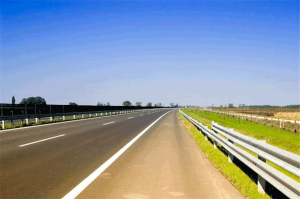Did a Cost-Cutting Modification Affect the Safety of a Guardrail Element?
 In another case of what may be safety equipment doing more harm than good, states across the country are joining in a boycott of certain guardrail end terminals manufactured by Trinity Highway Products, LLC, a business of Texas-based Trinity Industries, Inc. Last week New Jersey became the thirty-first state to join this ever-growing list when the State’s Department of Transportation and the New Jersey Turnpike Authority, which also oversees the Garden State Parkway, announced they were banning the use of these products in both new construction and maintenance projects at least until further safety tests can be conducted.(1)
In another case of what may be safety equipment doing more harm than good, states across the country are joining in a boycott of certain guardrail end terminals manufactured by Trinity Highway Products, LLC, a business of Texas-based Trinity Industries, Inc. Last week New Jersey became the thirty-first state to join this ever-growing list when the State’s Department of Transportation and the New Jersey Turnpike Authority, which also oversees the Garden State Parkway, announced they were banning the use of these products in both new construction and maintenance projects at least until further safety tests can be conducted.(1)
The end terminals in question, part of Trinity’s ET-Plus System, have been connected to about 14 motor vehicle accidents that reportedly resulted in numerous injuries and at least 5 deaths. In theory, guardrail end terminals, when struck, are supposed to move with the vehicle and absorb at least some of the impact of the crash. According to reports, the ET-Plus end terminals have a tendency to lock rather than move when hit head-on by the front of an oncoming vehicle. This can result in the guardrail cutting through the oncoming vehicle like a spear. Numerous injuries, including amputations, have been blamed on this malfunction.(1)
These allegations from crash victims were the topic of a broadcast on “20/20,” the investigative news program produced by ABC television, last September. Then, last month, a Texas jury found the parent company, Trinity Industries, guilty of defrauding the federal government by covering up a change in the product’s design. According to reports, the company made modifications to the design of its guardrail end terminals in 2005, but failed to report those changes either to federal or state transportation officials at the time. The change in question reduced by an inch the size of a metal piece used in the guardrail end terminal. This change, it was reported, saved the company about $2 on each guardrail it produced for an estimated savings of $50,000 per year.(2)
Although the company has maintained its guardrail end terminals are safe and that the modifications had been approved by the Federal Highway Administration (FHWA) after safety questions were raised back in 2012, the Texas court ordered it to pay $175 million in damages. The company could eventually pay three times that amount under a statutory mandate.(2)
Trinity was given until October 31 to submit plans to the FHWA for further safety tests of its product. The company submitted the plans just under the deadline, avoiding a nationwide ban of its product. The FHWA did not disclose details of the company’s re-testing plan, but did say it would give the plan a careful and expeditious review.(3)
In the meantime, states across the country continue to ban the use of the end terminals in questions pending the new safety tests. According to a report published on November 6, the count was up to 39 states participating in the ban.(4) At least one state, Virginia, has talked about removing the effected products from its roadways. However, a plan for when that work would begin has not been announced and the state did say it would be abandoned if new testing showed the end terminals to be safe.(2)
- http://www.nj.com/traffic/index.ssf/2014/11/nj_joins_30_states_that_have_banned_guard_rail_par.html
- http://abcnews.go.com/US/controversial-guardrail-4x-involved-fatal-accident-study/story?id=26521833
- http://abcnews.go.com/US/wire-guardrail-company-avoids-nationwide-ban-crash-test/story?id=26613762
- http://abc7.com/traffic/football-star-dies-after-crashing-into-controversial-guardrail-system/384578/
 New Jersey Injury Lawyers Blog
New Jersey Injury Lawyers Blog

